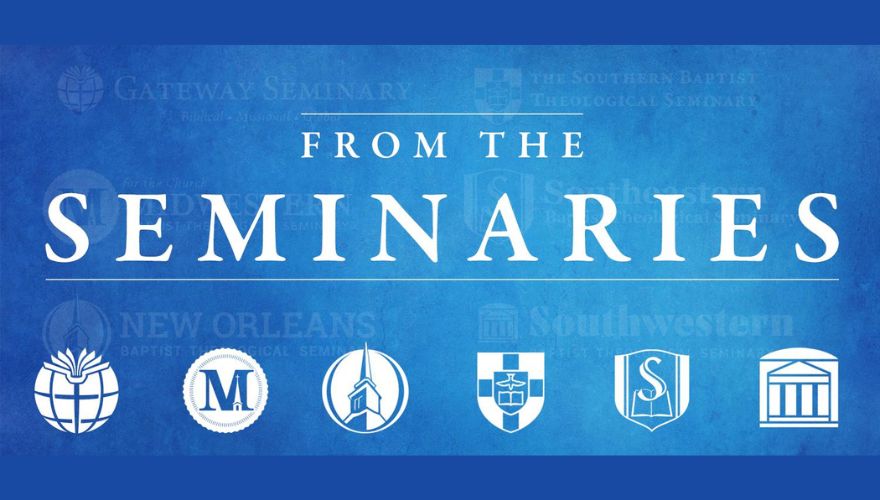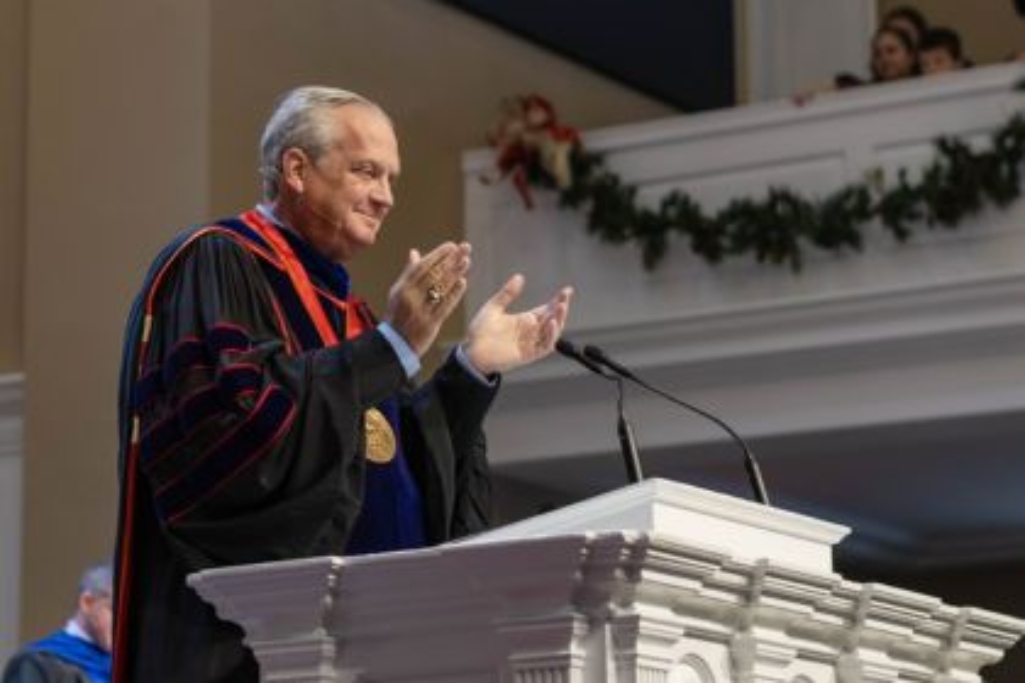
NOBTS partners with Baptist state conventions for pastors’ summit
By Timothy Cockes, NOBTS
NEW ORLEANS (BP) — New Orleans Baptist Theological Seminary (NOBTS) partnered with five Baptist state conventions to facilitate the Prepare Here Pastors’ Summit (Oct. 10-11), an event designed to encourage and equip more than 60 pastors from those different conventions.
A representative from each participating state convention, including four executive directors, spoke during the event.
The five representatives from the participating conventions were:
- Stephen Rummage, executive director-treasurer of the Florida Baptist Convention, who spoke in one of the plenary sessions on Thursday (Oct. 10).
- Shawn Parker, executive director-treasurer of the Mississippi Baptist Convention Board, who spoke during one of the event’s breakouts.
- Rick Lance, executive director of the Alabama Baptist State Board of Missions, who spoke during the closing plenary session.
- Roc Collins, strategic objectives director for the Tennessee Baptist Mission Board, who spoke during one of the event’s breakouts.
- Steve Horn, executive director of the Louisiana Baptist Convention, who spoke during one of the event’s breakouts and participated in a panel discussion on Friday (Oct. 11).
In addition to Horn, the Friday afternoon panel featured NOBTS President Jamie Dew as well as Jim Henry, pastor emeritus at First Baptist Church of Orlando, Fla., and Waylon Bailey, senior pastor of First Baptist Church of Covington, La.
Before the panel began, Dew thanked the group of executive directors for their continued partnership.
“I’m grateful that we get to partner together to do this kind of stuff,” Dew said. “I think this is the kind of thing that we need to be doing as Southern Baptists. We really ought to find these different moments where different layers of the (Southern Baptist Convention) SBC can partner together and find events like this that can be genuinely edifying to people. I’m grateful for you brothers.”
Dew encouraged pastors at the event to press on in their ministry, but also seek help as they go.
“Thank you all for coming, and I hope that you all have been encouraged this week,” Dew said.
“I want you to know, and I think I can say this on behalf of the state execs as well, if any of us at any time can ever help you, please let us know. We exist for you, we are your servants and we want to do everything we can to strengthen you personally and we want to do everything we can to strengthen your church. We want to keep as many of us in the work as we possibly can because it matters that we have people out there doing what we do.
“I don’t think there’s any more important task on planet Earth right now than preaching the gospel of Jesus Christ. Keep being faithful in the pulpit and feed your people. Keep your heart, mind and spiritual affections for the Lord cultivated and nurtured. If we can help you with any of that along the way, I just want you to know that we’re here to help.”
The panel discussion focused on the topic of ministry pipeline shortages. Panelists spoke about older pastors who mentored them as they were pursuing ministry, and about how current pastors can do the same for the younger generation of leaders.
Horn shared his personal story of being called to preach at 15 years old and commented on the important role his church played in mentoring him.
“I am so grateful that they (his church’s pastors) were persistent in really making me preach in those early days,” Horn said.
“I think we make this a lot more complicated than it is. Our stories are all similar in that somebody really helped us and gave us opportunity. I don’t think we can talk enough about that.”
In addition to Friday’s panel, the summit also featured plenary session messages from Henry, Rummage, Lance and Reggie Ogea, director of the Jim Henry Leadership Institute at NOBTS.
Breakout topics during the event included managing personal finances, confronting discipleship dysfunction, leading congregational change and addressing cultural crises.
Each of the state conventions also held their own convention-specific breakout session on Thursday afternoon.
During his plenary session on Thursday, Rummage spoke about how relying on God’s strength is the key to overcoming adversity in life.
“Trials are an inescapable reality of ministry, but God wants us to trust Him in the midst of those trials so that those trials can become trails that bring us closer to Him,” he said.
Lance closed out the event with a final challenge for the group of pastors on Friday evening about pressing on through failure.
“Just because we fail at times doesn’t mean that is the epitaph of our ministry,” Lance said.
When ideas have consequences: Hadley Arkes delivers Norton Lectures
By Travis Hearne, SBTS
LOUISVILLE, Ky. (BP) — Southern Baptist Theological Seminary (SBTS) hosted renowned scholar and public intellectual Hadley Arkes for this year’s Norton Lecture Series, Oct. 8-9. Arkes is the Edward N. Ney Professor of Jurisprudence and American Institutions emeritus at Amherst College and founding director of the James Wilson Institute on Natural Rights and the American Founding. His books include “Mere Natural Law,” “First Things: An Inquiry into the First Principles of Morals and Justice” and “Natural Rights and the Right to Choose.”
“Ideas have consequences, and ideas can change lives,” said Andrew Walker, ethics professor at Southern Seminary. “Arkes integrates theology with practice. He not only has all of the right ideas but also a love for the law and advocacy that is not a mere intellectual exercise.”
The title of the lecture series was “The Pervasive Moral Logic of the Law: A Reawakening.” Arkes emphasized the importance of considering the ideas which should ground our politics. “The test of political and legal moral judgment is if a man can give reasons for his actions,” Arkes said. “Can he explain the principles that connect what he does this week, last week and the weeks to come?”
According to Arkes, political science is the highest science that applies the universal principles of right and wrong to everyday life and builds society. “At its best,” Arkes said, “Political science is the science of reflecting on the principles of justice, the nature of the just political order, and the things we are justified in imposing on people with the force of the law.”
For Arkes, the first principles of natural law should create the moral foundation of all political order. Natural law is discoverable through reason and establishes the universal and basic principles of right and wrong. “The good or the right is that which everyone ought to do, the wrong is that which everyone should refrain from doing. The good is always more desirable, and knowledge of the ends for right and wrong is a higher good. These principles are universal notions of right and wrong.”
Arkes called for a reawakening of the framework of ideas that grounded the American Constitution. He criticized conservative judges who based their decisions on only the text of the Constitution without the moral principles of the natural law that were foundational to its origins. “Even conservative judges are averse to moving outside the text of the Constitution,” Arkes said. “They become shy at appealing to the most objective truths grounded in nature that can provide the most invincible ground for their judgments.”
Arkes also spent time with Ph.D. students at Southern Seminary at the 1892 Club, where he further discussed his faith and scholarship. Walker believes the lectures by Arkes are the exact kind of arguments today’s students need to confront reigning ideologies.
“Dr. Arkes’ lectures provided students an opportunity to challenge the legal orthodoxies they may not have even known were recent approaches to the law,” Walker said. “Our legal establishment is awash in positivism, which is the idea that law can be stripped of all legal concerns. The lectures demonstrated the necessity for the logic of morality to inform the logic of law. Such an idea is considered radical in today’s legal academy. But for the Christian, it is a simple reminder that law does not serve itself. Law serves the common good by being grounded in a sound account of first principles, the first of which is the idea of a Divine Law-giver.”


